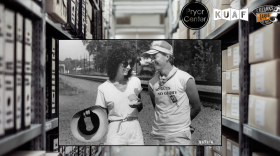Above the bustling streets of Fort Smith, a unique sight awaits atop Baptist Health’s Marvin Altman Fitness Center. The building’s roof is home to Arkansas’ first rooftop vegetable garden.
Under the careful management of Special Projects Manager Hannah Schultz, this garden has become a green oasis and a source of nourishment for those in need throughout the River Valley.
“So this rooftop has a growing area of approximately 6000 square feet,” Schultz said. “And so we're utilizing this space with a variety of grow buckets or large Purina feed buckets that have been repurposed and fabric grow buckets. So, we grow a variety of our crops depending on their size in these different ones. And we have 360 up here right now.”
Those plants include leafy greens like basil, kale, and spinach and hearty vegetables like broccoli, radishes, and beets.
Schultz said the garden is an extension of Baptist Health’s Food RX program, which began at the healthcare system’s Little Rock campus.
“So what that is essentially is that through the care that is provided to inpatients at this location, we are identifying and screening individuals to assess whether they have food insecurity needs,” she said. “And whenever they are presenting with food insecurity, we then give them a referral to the garden and the food pantry. So, once we screened them, those referrals go to our case management and to our pastoral services, and they will gather a food bag that is specific to them and their household size. And they will deliver that to them and that food will last for a period of three days based on the quantity given.”
Schultz said that she chose to create the garden because food insecurity is especially prevalent among families in the river valley.
“Food insecurity in the River Valley is 40 times higher than it is than the national average,” she said. “So, we are seeing a very high rate of food insecurity for individuals in our service area. That's Crawford County, Sebastian County, Leflore County and all the surrounding. So what we're trying to do to combat that is– What place in the community sees the most people? That's a hospital, you even have a free ride built into it, you know, so anyone can get here. So once they've arrived and checked into inpatient, they're screened by case management or nurses. And once we identified them, we deliver that bag to them personally.”
You do need to be a patient at Baptist Health Fort Smith to receive this specialty care. The Food RX program is continuing to improve and adjust its outreach according to each patient’s health. Schultz said that patients at Baptist Health Fort Smith can now receive a specialty bag tailored to their specific dietary and culinary needs.
“So if individuals do have a heart condition, we're able to get them more fresh fruits and vegetables, lower sodium, lower carb and healthier options,” she said. “We also have a food bag specifically for our unhoused population. So, whereas we may have put a item that needed to be cooked or baked on the stove or something like that, we can actually provide them now with items that do not need to be baked and they have high protein, things like that. And that's where the garden comes in. We can now supply them as well with fresh fruits and vegetables that they can keep, so we're trying to make sure that we can hit all those points within our community.”
The rooftop garden is a uniquely Fort Smith aspect of the Food RX program. Shultz began the project as an intern for the hospital with little to no experience in horticulture. She said that since there isn’t another large-scale rooftop vegetable garden in the state, she had to look elsewhere for guidance.
“I modeled this garden after the Boston Medical Center,” she said. “So they have a growing space that's very similar to our own. And so I reached out to them and contacted them and learned a little bit about how they do that. And so figuring it into the space that we have and the help we're gonna have. I also went through the River Valley Master Gardeners and pitched the idea to them before I started constructing this, and they were very interested to take on this project– Not only for the food insecurity for what we can do for the community, but they've never taken part in gardening of this type at this size in this location. And so it's kind of a learning experience for all of us.”
So why take to the roof? Even though the hospital had ample room for installing a ground-level garden, Shultz says she elected to take the rooftop approach because pests have a hard time scaling hospitals.
“So we're not going to have the bunnies, we're not going to have the dogs walking through, we're not going to have individuals walking through and maybe compromising the integrity of our vegetables,” she said. “Because we're up here as well. We also don't have a large variety of parasites. So we don't have a lot of earthworms. We don't have beetles. We don't have things that can require the use of pesticides and things like that. So we're trying to grow a very healthy crop and safe, and this is a contained environment where our volunteers can feel safe when they come up here to perform their duties as well.”
Volunteers from the River Valley Master Gardeners help Shultz maintain the garden. In fact, Shultz said the roughly $25,000 project wouldn’t have been possible without the collaboration between groups and businesses across the region.
“As far as the garden goes– So everything that you see in this garden was donated by the community, which is very exciting,” she said. “One of our most gracious donors was the Sebastian County Co-Op and the Farmers Co-Op, they donated all of these tubs here through one of their probe programs, where it's recycling Purina feed tubs. Additionally, individuals like Ace Hardware, Atwoods, and Home Depot– They donated things like seeds, soil tools, all that you see up here. So we're very grateful. And Walrod’s also donated quite a bit of post material for us. So, this garden was completely funded by the community. So, that was very exciting to see the community come together to support a project that can help our individuals that just need a little bit more help or a different kind of help.”
The Farmers Co-op also took it upon themselves to write a grant for the program, allowing Shultz to install a $2,500 drip irrigation system. As a transplant to the area, Shultz said the garden manifests what inspires her about her new community.
“I've lived in several different cities throughout the state,” she said. “And while I can definitely say I've seen community support and all of those areas, I've seen nothing like I have in Fort Smith. Fort Smith is a very motivated community and a very involved community. And that gives me a sense of pride, especially with this project and going forward with others, that Fort Smith has its heart in the right place and that we're trying to get to where we need to be for everyone. And that is a comforting feeling and a very hopeful feeling.”
As summer continues, more crops will ripen and more fresh produce will become available for the community. More information about Baptist Health’s Food RX program can be found here.
Ozarks at Large transcripts are created on a rush deadline by reporters. This text may not be in its final form and may be updated or revised in the future. Accuracy and availability may vary. The authoritative record of KUAF programming is the audio record.








